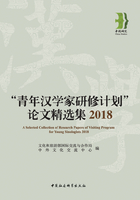
Media,publishing and information activities
In terms of Media cooperation and influence,the English-language newspaper supplement “China Watch”,produced by China's largest English-language newspaper,state-owned China Daily has been featured in two German newspapers,the Handelsblatt,and the Süddeutsche Zeitung(Deutsche Welle,2018). Further cooperation has been underway in the entertainment industry,as for example in the recent cooperation agreement between Studio Babelsberg and Wuxi Studio.
●China in the German public opinion
In an ideal scenario,public and cultural diplomacy exercise a positive effect on country perceptions and attitudes towards the country. A representative study on public opinion in Germany towards China reflected an overall positive image with diverging results for opinion on bilateral political and economic relations. In 2016,opinions on Chinese economic power is viewed with less preoccupation than two years before(2014:49% and 2016:44%). In 2016,59% of Germans believe that China's economy 31 has a rather large(42%)or very large(17%)influence on Germany. Within the group of economic decision-makers,this share is 69%,and among policy-makers even 90% of respondents(Huawei,2016). And while there is an overall increased interest and rise in preference formation,the rise of the Belt and Road Initiative further drew attention to the changing role of China for Germany,exercising impacts bilaterally as well as in the wider EU context with consequences for Germany(Harnisch,2018). In the end,there needs to be more specific empirical evidence until which extend German public is responsive to Chinese cultural diplomacy and open to influence over the long-run. Building up credibility and building up trust,the views of the public opinion and support for particular issues can be triggered.
●The impact of Chinese cultural diplomacy on Sino-German Relations
Public diplomacy has an important function in the relations China maintains with Germany. Ahead of the G20 in Germany,the arrival ceremony of the pandas at Berlin Zoo,in the form as loans from China,was attended by German Chancellor Angela Merkel and Chinese President Xi Jinping. This received high-level media attention and reinforced a narrative of an empowered China with global and strategic self-presentation. In terms of agenda-setting of Chinese cultural diplomacy activities in Germany are emphatic about Chinese culture and traditions,their historical roots and the non-political component to these elements. The analysis shows the distribution of Confucius Institutes and the increased engagement of Chinese actors in educational exchange schemes. One of the impacts of these recent developments are voices in German media and civil society concerning a potential surge in Chinese influence-taking in Germany(Stepanet al,2008),being sceptical of the motivations underlying Chinese cultural diplomacy. Possibly creating reputational issues for China,cultural diplomacy could achieve the opposite of its desired effect. Lastly,another aspect concerns who reaches out. Whereas actors are mainly central government or central government affiliated(e.g. state-media,Confucius Institutes or the China Culture Centre),provincial level cultural diplomacy activities occur through exhibitions,etc.